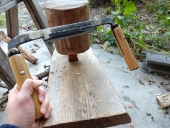posted 8 years ago
We have a museum and have moved 41 buildings here so far. We're setting up every craft and trade common to a small town 150 yrs. ago. We'll end up with something like 34 shops, plus a school house, post office and Gen'l store. Among the reasons we are doing what we do is to save history, and to preserve fast disappearing trades. Depending on where a person lives, what is disappearing is widely different. We have many Amish communities near here, so harness & horse collar making, buggy building, broom making, blacksmithing, weaving, book binding, wood working, cheese making, tin making, steam engine running and repair, rope making, wagon & buggy wheel making, and such, are all fairly common. In other areas without an Amish presence, those skills/trades are much less common. No matter what the trade, it can take years to gather the equipment and learn how to do WELL what it takes to practice the trade.
My suggestion to you is to figure out what trade really interests you. Find somebody somewhere to teach it to you. Then learn it really well. To "save" something, you need to be a master at it. Anything less is just a hobby. One place to start your search for your hearts desire is YouTube. There are hundreds of videos on how to do everything. Start to learn, become an apprentice, then start to get good..
P.S. Blacksmithing is still quite common. If you like working with metal, large copper kettle making is much less common.
www.ohiofarmmuseum.com www.stonegardenfarm.com
Creating sustainable life, beauty & food (with lots of kids and fun)

 4
4




 3
3




















 1
1




 1
1




 1
1




 3
3











